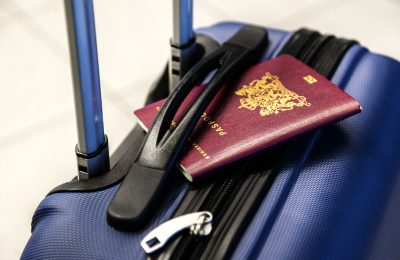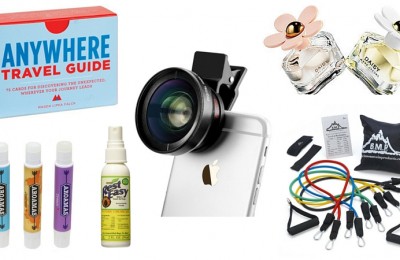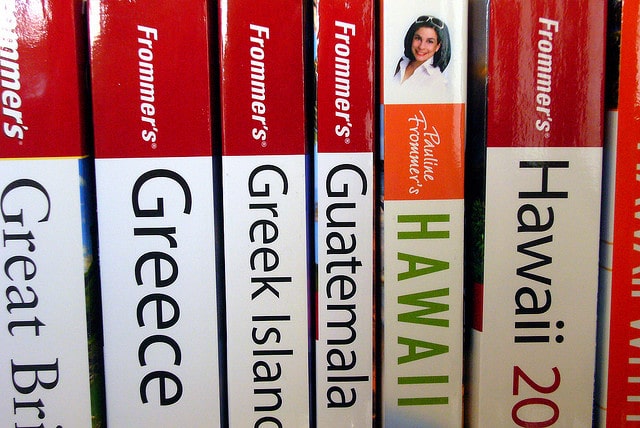With all the focus on apps, social media and smart phones (oh my!), don’t forget that using a traditional non-digital guide book (the kind written and published by travel experts as opposed to just user reviews) can be incredibly effective at planning and navigating any abroad adventure.
While of course using maps and smartphone apps are nearly essential to today’s traveler (I would probably still be wandering Amsterdam if it weren’t for the offline map app ‘Stay’), there are some benefits of using a traditional guidebook.
The Pros of Using a Guidebook:
It can be accessed without wifi.
Don’t worry about having to ask the bartender or hotel desk for the complicated or unreliable wifi password, just open the book and be on your way.
It won’t run out of battery.
Forgot your charger in another country? Can’t find your EU converter? Have no fear because guidebooks don’t need to be charged!
(Almost) It’s pickpocket-proof.
While you should always be careful with all your belongings abroad, someone is less likely to pickpocket a guidebook than an iPhone. You won’t lose your way, even if you lose your phone.
It’s something to read while waiting.
On a bus across Spain, at an airport layover in Germany, waiting in a long line at customs… There is plenty of transition time abroad to read up on your next destination before you get there and you don’t have to conserve battery life.
You’ll remember what you did.
The best thing about a guidebook is you can write in it! Highlight your favorite places, cross out any duds, and make notes on where you definitely want to go back to. **Don’t forget to mark the bar with really big, really cheap drinks or the restaurant with the waiter that takes extra good care of you!
Learn about your destination. Most guidebooks include local traditions, culture & language tips, and history about the country or city that will help you fit right in and get acquainted with a new place before you get there. Some books even include walking tours and museum guides that might save you some cash along the way.
Published source= reliable source.
With a published guide book there’s no questioning the validity of the source or forgetting which website had the directions to that famous landmark. New issues and editions of traditional guidebooks are released annually to make sure you’re getting all the latest information.
It’s tailored to what you need.
Instead of scouring the web for different sites to find hotels, restaurants, and travel recommendations, guidebooks usually have all of this information organized into chapters or sections. Guidebooks also come by city, state, country and region to offer you whatever help you need on your next adventure.
Top Travel Guidebooks for Study Abroad Students:
• Rick Steve’s – I used his guide to Spain in every city I visited. His detailed “Madrid Walking Tour” was a perfect activity when my parents came to visit and the “Tapas Cheat Sheet” sure came in handy. Reading along feels like having a knowledgeable friend by your side and his books are reader-friendly, not intimidating, and extremely reliable.
• Lonely Planet – LP books are written by experienced and insightful travel experts. Since they don’t include any advertising, you can trust the recommendations are honest and objective. Pick any location in the world and start exploring with a guide that is “interested in the adventure as much as the destination.”
• Let’s Go – “A Leader in Student Travel,” these guidebooks are written “for students by students” so you can count on some relatable travel tips. They even launched a new student-run blog this year and the books are also available as ebooks and PDF. Let’s Go!
• Eyewitness Travel Guides – With thousands of photographs, maps, and specific background information, Eyewitness Travel Guides create a thorough and inclusive guide to each city and country they cover; even offering guides to US cities to continue your traveling at home. All travel guides include background info on history, culture, architecture, and art (and pullout street maps!).
• Frommer’s – With 350 guidebooks and 14 series in just over 50 years, Frommer is one of the most trusted names is travel. The mission of wanting to help you “explore the way locals do” put Frommer on the map and has kept them there for decades. Frommer has seen it all and will help you do just the same!
Most guidebooks have related blogs, smartphone apps, and websites, so do some research online before you invest in the type of guidebook suited to your travel plans. Try to read some chapters before you reach your destination so you’ll have a better idea of what to expect and know what to look for in your new city. The plane ride is the perfect time to read up! As always, use your guidebook as a guide and don’t be afraid to go off the beaten path and make your own plans in your new surroundings.
Do you use a guidebook when you travel? Let us know which ones in the comments!
Photo sources: davitydave via Flickr, Sev! via Flickr
















































Rick Steves is my favorite. For one city I visited with friends, he had a note that said something like, “Don’t go on the beach at night because there are gangs.” Sure enough, we made the mistake of not booking accommodations our last night, so we tried sleeping on the beach or hanging around until we could get a cab to the airport, and it was SKETCH. I’m pretty sure I was offered drugs in another language. Since then, I listen to anything he says. If he says to watch out, I believe him, because he wasn’t kidding about that beach.